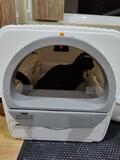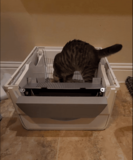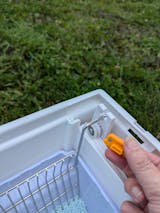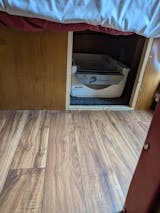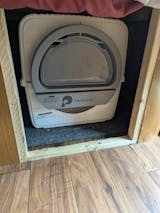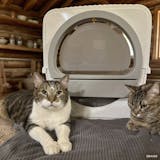Cats may poop outside the litter box for several reasons, including health issues, stress, a dirty litter box, poor box location, changes in their environment, or the presence of new family members. If this behavior persists, consult a vet to rule out any health problems or behavioral issues.
Health Issues
Diarrhea or Constipation. When a cat experiences diarrhea or constipation, the urge to defecate can be sudden and overwhelming, sometimes preventing them from reaching the litter box in time. This situation should be temporary, provided there are no underlying health conditions. However, frequent episodes warrant a vet visit.
Arthritis:Older cats with arthritis may experience pain and difficulty climbing into the litter box, leading them to relieve themselves on the floor next to it. Discuss with your vet how to accommodate your aging cat, possibly with a box that has lower sides or is easier to access.
Smelly Litter Box
Cats are very particular about cleanliness. If the litter box is not clean, even cats that have been litter trained for years might reject it. Ensure to scoop clumps daily and perform a deep clean frequently.
Additionally, changing the type of litter can cause issues. Cats might not like the texture or scent of a new litter and may avoid the box. Try to stick with a litter your cat is used to and gradually introduce any new types.
Wrong Box Location
The location of the litter box can be a significant factor. If it’s in a high-traffic area or a place that’s hard for the cat to reach, they may avoid it. Place the box in a quiet, private location that's easily accessible. Cats need a sense of privacy when they go.
Avoid moving the litter box if your cat has dementia, as it can lead to confusion and exacerbate the problem.
Changes in the Household
Changes such as introducing a new pet or baby, moving to a new home, or altering the family routine can cause stress for a cat. This stress can manifest in behaviors like pooping outside the litter box. Typically, this behavior is temporary and should resolve as the cat adjusts to the new circumstances. Ensure your cat has a quiet, secure space where they can retreat and feel safe during transitions.
Recently Adopted Cats
Recently adopted cats might take weeks or months to adjust fully to a new home. During this period, they may exhibit various stress-related behaviors, including inappropriate elimination. Make sure your new cat knows where the litter boxes are and that they have easy access to them. Consistency and patience are key during this adjustment period.
Stress
Just like humans, cats can get stressed when their environment and routine are disrupted. Events such as moving to a new house, construction noise, or changes in their usual space can cause stress. This stress might result in unusual behaviors, like pooping outside the litter box. Identify and mitigate stressors as much as possible to help your cat feel more secure.
How to Stop This Behavior
Clean the Box
Regularly scoop the litter box daily to remove waste and maintain cleanliness. Perform a deep clean periodically: dispose of the old litter, scrub the box with mild dish soap and warm water, rinse thoroughly, and let it air-dry before adding fresh, unscented litter. Always use rubber gloves and a face mask to protect yourself from bacteria and dust when cleaning the litter box.
Focus on Location
If your cat frequently uses a specific inappropriate spot, block access to that area with a baby gate or by keeping the door closed. Meanwhile, place the litter box in a quiet, private area far from their food and water bowls. Cats prefer a secluded spot where they can go without feeling threatened or disturbed.
Add Another Litter Box
In multi-cat households, it’s essential to provide one litter box per cat plus an extra one. This helps prevent territorial disputes over litter boxes. Place the boxes in different locations around the house to ensure one cat doesn't guard them all and to make them accessible from various parts of the home.
Put Up Obstacles
To deter your cat from using a particular area, cover it with aluminum foil or spray it with a cat-safe deterrent. The goal is to make the area unattractive and uncomfortable for the cat, encouraging them to use the litter box instead.
Recreate the Scene
Observe where your cat prefers to poop and mimic that surface in the litter box. For instance, if your cat likes to poop on tile, leave the bottom of the litter box bare. If they prefer paper, line the box with paper. If they go on carpet, place a carpet remnant inside the box. This can help transition them back to using the litter box.
Clean Up Accidents
Thoroughly clean any areas where your cat has pooped outside the litter box using an enzymatic cleaner. These cleaners break down the odors at a molecular level, preventing your cat from being drawn back to the same spot by lingering scents.
When to Call the Vet
If your cat has a single accident but resumes using the litter box the next day, there’s likely no cause for concern. However, if your cat continues to poop outside the litter box for multiple days, consult your vet to check for any underlying health conditions. Persistent behavior changes often indicate health issues that require professional attention.
By addressing these factors and following these steps, you can help ensure your cat feels comfortable using their litter box consistently.


